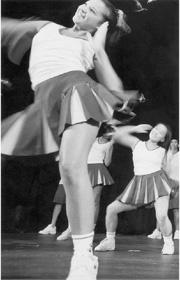YOUNG, HANDSOME, AND FRESH out of the University of Iowa’s MFA program, David Wong Louie made quite an impression at my college in New York, where he taught in the early ’90s. I knew several students who preferred to discuss his alpine cheekbones over the novels of Toni Morrison, which were part of his curriculum. So it seems appropriate that the protagonist of Louie’s first novel, Sterling Lung, a 26-year-old chef trained in the art of French cuisine, is a Don Juan of sorts—albeit a neurotic, guilt-ridden one—wooing women with food. The Barbarians Are Coming is a story about cooking and loving, often as sensual as Laura Esquivel’s Like Water for Chocolate, but also as bitingly funny as Nick Hornby’s High Fidelity.
THE BARBARIANS ARE COMING by David Wong Louie (G.P. Putnam’s Sons, $23.95)
With the same taut, witty prose that won him the Ploughshares Award for his 1991 collection of short stories, Pangs of Love, Louie takes us on the roller coaster ride of Sterling’s neurotic love life. Within the first two chapters of The Barbarians, Sterling thwarts his clinging long-distance girlfriend, Bliss, sending her postcards that are “short and sweet, public enough so things can never get too involved or serious.” He then pursues Lisa Lee, a blind date who turns out not to be Chinese as he’d expected, but a 6-foot-tall Venus with a voracious appetite. Lust swells in Sterling as “she sinks her teeth into the perfectly browned skin” of the capon he’s prepared. Meanwhile, Bliss races down the interstate to stop the potential affair.
If Asian American men have been desexualized by Charlie Chan stereotypes, Sterling, with his long ponytail that women like to fondle, seems oblivious to it. After his dinner with Lisa Lee he masturbates in every room of the giant house of the Richfield Ladies’ Club where he is the resident cook, his wine-softened head swirling with fantasies of bedding the blue-blood members. Sterling’s party is dampened, however, when his parents, ridiculously named Genius and Zsa Zsa, beckon him to marry a woman from Hong Kong, a picture bride whom they’ve brought to America. What follows is a difficult emotional path along which Sterling constantly finds himself reconciling desire with duty.
Louie eventually shifts from Sterling’s romantic life to the love/hate relationship with his parents. The latter is the more familiar territory of Asian American fiction, with the Americanized child balancing the old ways with the new, but Louie revamps the common scenario with muscular, punchy prose. Often embarrassed by his “chinky” father who runs a hand-laundry business, Sterling is most impressed when Genius explodes at a couple of sneering racists, shouting “‘Fuck you!’ without a trace of accent.” Later, as his father hands him some coins to make a phone call, Sterling reflects, “I wanted to remember my father’s imitation of a real man, the man with the dangerous voice, the man with a palm of silver.”
Following some five years of Sterling’s life, Louie provides plenty of plot tension and surprises. Marriage, children, and divorce come, but not in any predictable manner. The book’s energy runs a bit low as Sterling becomes increasingly guilt-ridden at not living up to his parents’ dreams. By the end of the book, when Sterling seems a defeated figure, it’s hard to believe that this is the same giddy man who once had two dates in one night. Still, for all that, The Barbarians is an intoxicating, heady trip, a feast of a novel.
David Wong Louie reads at Nippon Kan Theater on March 13 at 7:30pm.







